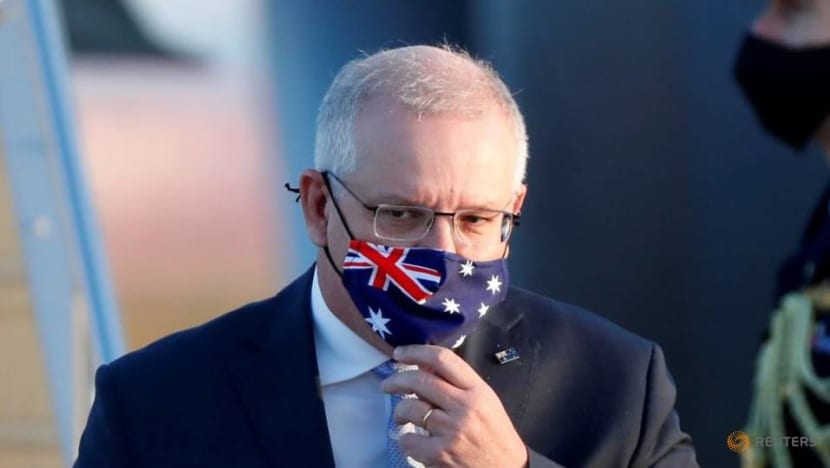China rebukes Australia for 'Cold War mentality' after Belt and Road accords cancelled

Australian Prime Minister Scott Morrison. (File photo: REUTERS/Issei Kato)
SYDNEY: Australia said on Thursday (Apr 22) that it cancelled two accords between Victoria state and China on the Belt and Road Initiative because they were out of line with the federal government's foreign policy, which sees a "free and open Indo Pacific" as a key goal.
A Chinese foreign ministry spokesman responded by urging Australia to abandon its "Cold War mentality and ideological bias" and "immediately correct its mistakes and change course".
The Chinese embassy earlier criticised the move by Foreign Minister Marise Payne to veto two agreements signed by Victoria state as "provocative" and said it would further damage ties.
Prime Minister Scott Morrison told reporters on Thursday the accords were cancelled because his federal government did not want other levels of government to enter into agreements that conflict with Australia's foreign policy.
"We will always act in Australia's national interest to protect Australia, but to also ensure we can advance our national interest in a free and open Indo Pacific and a world that seeks a balance in favour of freedom," he said.
Under a new process, states must consult with the foreign minister before signing agreements with other nations.
COMMENTARY: Belt Road Initiative a vision of a new global economic order, win-win collaboration
Payne earlier told local radio the policy was "not aimed at any one country". Wang Wenbin, a spokesman at the Chinese foreign ministry, expressed doubt over that claim during a regular news conference in Beijing.
"The Australian side reviewed more than 1,000 deals and only decided to cancel four, and two of them were agreements with China, so Australia's claim that the decision doesn't target any particular country does not hold water," Wang said.
The spokesman warned Australia against travelling "further down the wrong path to avoid making the already strained China-Australia relations worse".
Speaking to reporters in New Zealand after meeting with her counterpart Nanaia Mahuta, Payne said Australia sought a clear-eyed and practical engagement with China, particularly as the world emerged from COVID-19.
"We also have to acknowledge that China's outlook, the nature of China's external engagement, both in our region and globally, has changed in recent years, and an enduring partnership requires us to adapt to those new realities," she said.
China is the largest trading partner of New Zealand and Australia.
READ: Australia faces down China in high-stakes strategy
Mahuta on Thursday repeated comments that New Zealand valued the Five Eyes security alliance – which also includes Australia, Britain, Canada and the United States – but questioned whether it was the right platform for New Zealand to speak out on human rights issues.
The comment, first made on Monday, has been widely interpreted as referring to recent Five Eyes joint statements criticising China.
In a joint written statement that did not mention China, Payne and Mahuta said they had "reaffirmed their intent to work together to preserve the liberal international order that has underpinned stability and prosperity in the region, and to foster a sustainable regional balance where all countries – large and small – can freely pursue their legitimate interests".
COMMENTARY: China and Australia went from chilly to barely speaking. That could have been avoided
Australia's conservative coalition government had declined to agree to a country-level memorandum of understanding (MOU) with China on the Belt and Road Initiative.
But Victoria Labor Premier Dan Andrews signed an MOU to promote the infrastructure development initiative in 2018 and a framework agreement in 2019, saying it would bring Chinese investment to his state.
Hans Hendrischke from the University of Sydney Business School said the cancellation of the agreements would have minimal commercial impact because no projects had begun.
"It had no legal force and there were no specific deals," he told Reuters.
Diplomatic relations between Australia and China have worsened since Canberra called for an international inquiry into the origins of COVID-19, prompting trade reprisals from Beijing.
Fitch Ratings said economic co-dependencies between Australia and China will restrain Beijing from targeting major exports such as iron ore.










